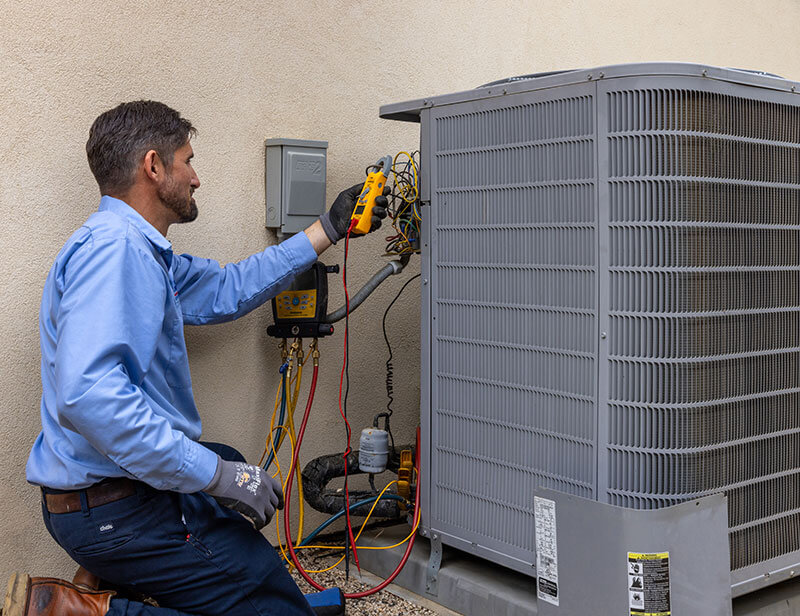Professional Maintenance Services by DMAKS HVAC You Can Trust.
Professional Maintenance Services by DMAKS HVAC You Can Trust.
Blog Article
Energy-Efficient Cooling And Heating Systems to Reduce Utility Expenses
As energy costs remain to rise, the importance of energy-efficient a/c systems comes to be progressively noticeable. These systems not just assure significant financial savings on utility bills however also add to an extra lasting future by minimizing energy intake. With numerous alternatives available, including geothermal warm pumps and ductless mini-splits, homeowner face a plethora of selections that can improve comfort and air quality. However, understanding the crucial functions and maintenance needs is vital to optimizing these benefits. What variables should be focused on when picking the right system for your needs?
Benefits of Energy-Efficient Cooling And Heating Solutions
Energy-efficient A/c systems provide many advantages that extend past mere cost savings. By taking in much less power, these systems add to decrease greenhouse gas emissions, helping to fight climate adjustment and advertise sustainability.
In addition, energy-efficient HVAC systems commonly supply boosted convenience degrees. Most of these systems include innovative innovation that enables much better temperature control and improved air quality (DMAKS HVAC). This causes a much healthier indoor atmosphere, which is especially crucial for people with allergic reactions or respiratory system issues
In addition, buying energy-efficient heating and cooling systems can boost home worth. As more consumers prioritize power effectiveness, homes and structures furnished with these systems may attract higher quotes in the realty market.
Kinds Of Energy-Efficient A/c Options
Exactly how can property owners and businesses select one of the most ideal energy-efficient a/c choices for their demands? The market provides a selection of energy-efficient cooling and heating systems, each made to enhance convenience while reducing energy consumption.
One alternative is the variable cooling agent circulation (VRF) system, which effectively regulates the temperature in multiple zones within a building. This system adjusts its refrigerant circulation to match the preferred temperature level, causing significant power cost savings.
An additional prominent option is geothermal heat pumps, which make use of the earth's secure temperature to warmth and great areas. By moving warm to and from the ground, these systems show remarkable efficiency, specifically in moderate environments.
Furthermore, ductless mini-split systems provide an energy-efficient option for homes doing not have ductwork. These systems enable for zone-specific cooling and heating, minimizing energy waste in vacant locations.
Last but not least, high-efficiency heaters and a/c unit, with innovative SEER and AFUE ratings, use reputable climate control while taking in less energy than typical versions. By assessing these alternatives, house owners and businesses can pick a HVAC system tailored to their certain demands and energy efficiency goals.
Key Attributes to Consider

Next, explore the kind of compressor used in the system. DMAKS HVAC. Variable-speed compressors can adjust their output to match the heating or cooling need, causing improved convenience and power cost savings contrasted to single-speed versions. Additionally, seek systems geared up with smart thermostats that offer programmable settings and remote accessibility, permitting far better control over energy consumption
Another vital function is the system's air purification ability. High-efficiency filters can enhance indoor air quality and decrease energy usage by making sure the system runs successfully. Furthermore, consider the kind of cooling agent made use of; contemporary systems commonly utilize environment-friendly cooling agents that have a reduced ecological effect.
Last but not least, make sure that the system works with zoning this page technology, which permits for tailored temperature control in different locations of your home, improving comfort while reducing power usage.
Tips for Choosing the Right System


Next, take into consideration power effectiveness scores, especially the Seasonal Energy Performance Ratio (SEER) for cooling down systems and the Yearly Gas Application Performance (AFUE) for home heating systems. Higher scores indicate higher performance, which can lead to substantial savings on utility costs gradually.
Additionally, assess the sort of cooling and heating system that finest fits your way of living and budget. Choices consist of central air conditioning, ductless mini-splits, and heatpump, each with its own collection of benefits and downsides.
Don't you could try this out forget the relevance of correct installation and sizing; an incorrectly sized system can cause ineffectiveness and enhanced wear. Seek advice from with a specialist Heating and cooling professional to acquire professional recommendations customized to your home's unique demands. This comprehensive method will certainly guarantee that you pick an energy-efficient HVAC system that satisfies your demands and spending plan effectively.
Upkeep for Ideal Performance
When the right HVAC system is in area, continuous maintenance comes to be essential to ensuring ideal efficiency and durability. A properly maintained system runs better, leading to lower energy consumption and reduced utility expenses. Normal assessments and tune-ups must be scheduled at the very least two times a year-- when prior to the cooling season and as soon as prior to the home heating period.

Home owners need to also be alert about monitoring their HVAC system's efficiency. Uncommon noises, varying temperatures, or raised energy costs can show underlying concerns special info that need immediate interest. By addressing these concerns immediately, property owners can stop pricey fixings and extend the life expectancy of their systems.
Buying a maintenance strategy with a certified service technician not just enhances efficiency but likewise provides satisfaction, understanding that the system is running at its finest. DMAKS HVAC. Routine upkeep is consequently crucial for sustaining power efficiency and lowering total operational prices
Final Thought
Finally, energy-efficient heating and cooling systems present a practical option for lowering utility expenses while improving comfort and air high quality. By incorporating sophisticated innovations and choices such as geothermal warm pumps and ductless mini-splits, home proprietors can attain considerable power savings and contribute to environmental sustainability. Careful consideration of system functions and continuous maintenance even more guarantees optimum efficiency, making energy-efficient systems a sensible financial investment for both economic and environmental benefits.
Report this page